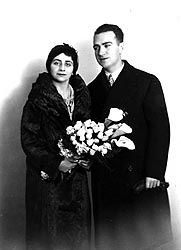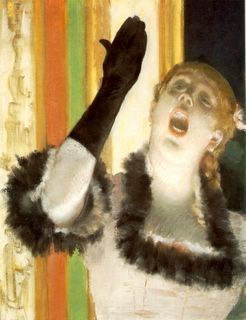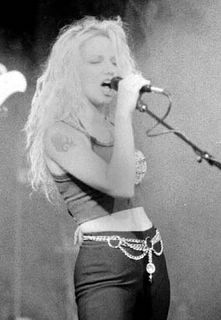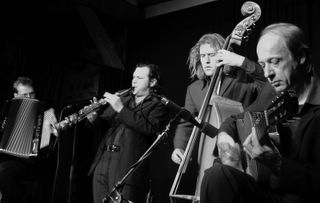We've stepped half a decade into the twenty-first century and it seems that, unlike the visual arts, the classical music world still have a lot of trouble trying to understand music from the last century. In performances of modern works, the moods and meanings of the pieces eludes even the most seasoned of performers. If the performers themselves couldn't connect to their pieces emotionally, how do we expect them to communicate with the audiences what those music are about? Schoenberg was probably right when he commented that his "music is not really modern, just badly played".
Twentieth century music consists of several styles of music composition techniques - serialism, aleatoric music, impressionism, minimalism, jazz-influenced classical music (please correct me if there is a specific term for such music) etc. It seems that the most problematic styles which the classical music world have trouble appreciating are that former two, but I'll going to post some of my opinions on minimalist music for I've been listening to a few of such pieces recently.
For those who are unsure of what's minimal music, they're simply music stripped of all the its complexity and exploits the use of repetition. And don't worry about the excessive dissonance that is so characteristic of twentieth century pieces, for minimal music consist of mostly, if not entirely, tonal harmonies. I've not listened to the whole range of such music, but I'll recommend Arvo Pärt's Sarah Was Ninety Years Old, Philip Glass's Closing (Listen out for the subtle changing rhythms and tone colours), Terry Riley's In C. Such a minimalist movement is also pretty much alive in popular music - trance music.
Now we have the definition of minimal music, the problem comes. Do we consider such minimalism as modernism or anti-modernism? Considering just the contents of the music, it consists of the simplest musical material and that'll mean the minimalist movement is a big step back in time. But the main factor is such music isn't so much of the seemingly minimal content as its experimental attitude and thus composers of minimalist works still have to struggle all the same to bring their music into the concert stage and recordings.
Minimalist compositions may sound meaningless, for they project audible changes gradually over prolonged periods of time and thus induces a trance-like state in its listeners. Yes, not much of the traditional passionate emotions involved, but I personally feel that such works allow the ear to delve deep into the resonance of the individual sounds. And it really emphasises on the purity of the sound. Within the extended length of one simple interval, the tone, timbre and intensity can change, bringing about a rich assortment of harmonics. It's like a violin increasing its volume over the span of one note and intensifying the mood. And in minimal music, I've realised that the focus isn't on the music or harmony, it's on the sound. The rich sounds draw the listeners into the pure and fascinating world of sounds. And that's the very beauty of minimal music to me.
Alright, that's all from me today, though there's so much more about minimalism to be commented, like its history and the progression into postminimalism. I'll write more when I've acquired more knowledge into modern music.
Friday, July 29, 2005
Minimalism
Wednesday, July 27, 2005
The Carnival of Music
"The Carnival of Music is a celebration of all things musical - listening to or playing it, writing or recording it, analyzing or criticizing it. Music history, music theory, and composition are all welcome and encouraged in featured entries. I will not limit genres; classical, jazz, pop, rock, rap, country -- all are welcome here."
-JohnL
This week, we have The Llama Butchers hosting the Carnival of Music #8. Be sure to visit their site, for there're a few interesting posts on music for this week. =)
Maybe I ought to submit a post for next week's Carnival by Scott Spielberg at Musical Perceptions. Shall probably write on my opinions on twentieth century music, which I've been listening to more often recently. If I manage to rush out my post by Friday that is...
Sunday, July 24, 2005
Maestro Joaquin Rodrigo

Late Maestro Rodrigo and wife, Victoria
I just got the DVD Shadows & Light on the late spanish composer Joaquin Rodrigo. It starts with Pepe Romero playing his most famous guitar concerto, Concierto de Aranjuez, and followed by all his smaller works played by renowned artists who are good friends with this wonderful composer. This is one moving story which touches me in a very special way whenever I listen to that concerto. And I'm incredible touched by the deep love Joaquin Rodrigo and his wife have for each other. The perfect romance...
For those who haven't heard this concerto before, I'd strongly recommend Pepe Romero's 2nd recording of it. Flawless and incredible moving, taking into account of the fact that Pepe has known Maestro Rodrigo since young. The only downside is that he does his vibrato like he's having a spasm. Well, shall write more of this wonderful concerto in the near future.
"Joaquín Rodrigo at 90 is an intimate and intensely personal exploration of the world-renowned Spanish composer. He has created some of the most beautiful music ever written. His Concierto de Aranjuez is as famous as Cervantes’ Don Quixote and the paintings of Goya. At 90, he is a man whose youthful exuberance and extrovert personality have yielded to the introversion and silent meditation of old age. ‘Shadows and Light’ portrays a man who has found inspiration in his belief in God but has also suffered greatly at the hand of his own demons. He is a man who has been blind since early childhood, but has never allowed his disability to inhibit his artistic vision. He is a man who is sustained by the love and support of his family, and who has always upheld the most basic values. His story is truly inspirational, as it has been to everyone who was involved in the making of this film.”
-Director Larry Weinstein, writing in 1993, said of his 60 minute film ‘Shadows and Light’
Food for Thought
"When you play music, if you truly surrender your ego and your self, you lose the awareness of your own body, and your body becomes the body of the sound. You perceive your own person as being inside the tone, inside the sound, and of course the audience is also inside the tone, so you are really one, and it's really difficult for me to know where I end and the public begins, I feel a real togetherness and a real oneness, bonded by the tone, by the actual physical vibration of the sound. And this is a wonderful experience."Alright, he did seem a little incoherent cause his native language is Spanish, but the meaning is there. I just didn't quite agree with the audience portion. When I think about the audience when playing music, it really takes out more than half of my attention from the music and I eventually can't connect with my music as well as in my practices. Maybe only seasoned performers are capable of being completely at ease when playing in front of huge audiences...
-Pepe Romero, renowned classical guitarist
Thursday, July 21, 2005
Interesting Comment
"the English do carol; the French sing, the Spaniards weep, the Italians... caper with their voices; the others bark, but the Germans (which I am ashamed to utter) do howl like wolves..."Now, that was written by this German writer in 1609. That sounds a little harsh on his fellow countrymen and I guess they really pissed him off pretty badly to make him come up with such a comment...
-German writer who took the Greek name Ornithoparchus
If this German singer...

howls like a wolf...

then how do you describe this...

Wednesday, July 20, 2005
Should It Sound Divine or Danceable?
I've never been very supportive of the latter school, especially when they twist and desecrate the works until the very essence of Bach's music is lost. It wasn't until I heard of Hilary Hahn's rendition of Bach that changed my mind. Or rather, she's an exception. She completely tore down the divine nature of the works and recreate a completely different yet amazing effect that is not at all inferior to the former camp. Her recordings of the 3 sonata and partitas captured my total attention the first time I heard them. It's taxing to listen to the Chaconne by Szeryng twice consecutively yet for Hahn, I can just go on and on without feeling any decrease in the intensity and passion. But well, what I could accept from the latter camp can only stop there. I can't accept how artistes like Lara St John and Yo-Yo Ma (his second recording of Bach) butcher up Bach and left his pieces unbearable for the ears.
Of course, now considering the fact that I play the guitar, it'd probably take a miracle on top of an impeccable technique and astounding musicality to make Bach's pieces sound divine. Well, maybe I ought to focus more on making it danceable, yet at the same time not take too much liberty with the tempo...
Sunday, July 17, 2005
Music to Start the Day

A scene from my balcony
It is Bach's Violin Sonatas and Partitas that I'm listening to now. It's amazing how a day can start off so beautifully in Henryk Szeryng's passionate rendition of Bach's music. I've finished my personal devotion and I'm waiting for the sky to brighten up. I'm sure such music would sound wonderful in the background when the first rays of the sun peep into the room...
No, I wasn't listening to his famous Partita No 2. It's a suite far too dark and overly passionate to be played in the beautiful morning. I don't exactly have the intention of having tears in my eyes this early in the morning... Shall devote an entry on this suite and its magnificent Chaconne (Ciaconna) in the near future.
Saturday, July 16, 2005
Biblical Music
Pastor Tan just gave his personal viewpoint on music today. It's a pretty good guide for an average person who listens to music for simple pleasures. But take me for example, if that's the definition for worship music that I am supposed to follow, I might as well just chuck all the classical sacred music down the dustbin and listen to contemporary Christian music for Bach's sacred cantatas affect and touch me so much more than contemporary Christian music. But well, Pastor Tan did tell me on the way home that modern pieces from Les Misérables can easily make him lose control, but he did emphasise that it is good influence. Hmm, now we're back at the same spot we started, aren't we?
Moreover, I've opened myself to contemporary Christian music before and I can safely say that in the midst of immersing myself in the music, God was never out of my mind. It's so nice to be able to allow the emotions flow through the whole body (which is what music ought to be about), and at the same time, thank God for making me feel alive. And then try asking those people who are against such music, they'll just tell you that it doesn't sound godly, when they don't even attempt to appreciate it. Then what exactly gives them the authority to condemn such music for worshipping God?
More often than not, I couldn't quite connect with the traditional hymns they sing in church, especially when the hymns they sing aren't very tuneful and the meanings of the words are very shallow. If we're talking about glorifying God, I'm pretty sure that certain contemporary Chrstian music will do a better job. Maybe it's due to the fact that I've listened to more complicated forms of sacred music and have much higher expectations. But I'm sure that God would still be happy as long as the hearts of us are towards Him. And I wouldn't be surprised too, if I see bands beating the drum and playing the electric guitar while singing praises in heaven...
It gets me uneasy when people start to condemn dances too. Take Bach for example, his dances are completely spiritual in nature and connects you to a Higher Being while feeling this strong urge to dance to the music. And take other forms of dances in churches for example, how do they know that those people who are dancing have cast God out of their minds? Just because people have a mental barrier against such forms of worship, they condemn them by saying that form of worship is wrong. Can't they just see that what they're doing is completely self-centred, myopic and selfish, especially when they themselves do not even try to appreciate it?
There probably isn't a definite explanation on what kind of music or dance is acceptable onto God, for the Bible gives very little information on them. But one thing, if someone ever propose to use jazz, tango or latin music for worship music, you can be sure that I'll be the first person to bite his head off. No one should ever associate the music which comes up from the lowest level of society (red light districts etc) to the most Holy God. Now, if God wants a standard, the Bible would probably contain a chapter on dance steps and music scores or even a CD enclosed behind. Hmm...
Thursday, July 14, 2005
Classical Guitarists in Their Own World
I have observed that classical guitarists are overly contented in just listening to guitar music. It's time they ought to come out of their own world and interact with the rest of the classical music community. Then they'll realise how much more they're missing. They're probably more familiar with the works of Fernando Sor and Isaac Albeniz as compared to those of Beethovan, Mozart or Chopin.
There's quite a wonderful music-blogging community out there. Would be adding more of the music blogs to my links in the near future.
Musical Hallucinations
Seven years ago Reginald King was lying in a hospital bed recovering from bypass surgery when he first heard the music.
It began with a pop tune, and others followed. Mr. King heard everything from cabaret songs to Christmas carols. "I asked the nurses if they could hear the music, and they said no," said Mr. King, a retired sales manager in Cardiff, Wales.
"I got so frustrated," he said. "They didn't know what I was talking about and said it must be something wrong with my head. And it's been like that ever since."
Each day, the music returns. "They're all songs I've heard during my lifetime," said Mr. King, 83. "One would come on, and then it would run into another one, and that's how it goes on in my head. It's driving me bonkers, to be quite honest."
Last year, Mr. King was referred to Dr. Victor Aziz, a psychiatrist at St. Cadoc's Hospital in Wales. Dr. Aziz explained to him that there was a name for his experience: musical hallucinations.
Dr. Aziz belongs to a small circle of psychiatrists and neurologists who are investigating this condition. They suspect that the hallucinations experienced by Mr. King and others are a result of malfunctioning brain networks that normally allow us to perceive music.
Extracted from http://nytimes.com/2005/07/12/health/psychology/12musi.html
Chanced upon this article when I was reading Scott Spielberg's blog here. Now, that's when you get too much music. It's scary listening to the same tunes on repeat mode perpetually, and worse when you don't have a huge range of music to listen to in the first place. That's the illness that struck Robert Schumann in his dying years and he was often bonkers as written in the history books. I'm thinking whether if I declare that I have this illness, will the Singapore Armed Forces from their service early...
Wednesday, July 13, 2005
Case of Play-What-You-Like?
Tuesday, July 12, 2005
Quadro Nuevo

Quadro Nuevo
Just caught this wonderful quartet on Arts Central on TV here. A truly talented group which ventures into tango, valse musette and film music. They sure got my whole body swinging and dancing to their tango rhythm. And I got to listen to their rendition of Angel Villoldo's famous El Choclo and learnt of the piece's history. Left a deep impression for Roland Dyens played that piece on his Nuages CD. To think that Angel Villoldo was a pianist in the red-light district of Buenos Aires and of course, the piece was inspired by what goes on there. I guess tango originates from the lower classes of the society, very much like flamenco. It's wonderful how much of that culture is brought out in their music.
Their guitarist, Robert Wolf, was formerly an accompanying guitarist on the tour with Paco de Lucia. Now, that does explain why his tone on the guitar is so thin and his technique is so flawlessly clean. To think that he played the whole solo piece with his eyes closed. That's total immersion into the music! Stunning!
Alright, if not for the fact that I'm practising an Argentinian Tango right now, I wouldn't even have thought of watching this quartet on TV. Now, their music sure led me into the world of swaying nightclubs in Argentina, old tarverns, passionate tango and overwhelming nostalgia. That's totally another genre apart from Baroque, Spanish romantic and flamenco music. But well, I guess my lifetime is too short for me to venture too deeply into such a mysterious and lovely culture...
Sunday, July 10, 2005
The Feeling of Love and Stravinsky
Went to Esplanade to spend the whole afternoon alone. Listened to the Rite of Spring of Igor Stravinsky. Yes, a paganistic ritual where a girl is sacrificed by dancing herself to death. This is one of Stravinsky's hardest-to-appreciate piece due to the lack of a lyrical melody line. After opening myself up to this music and getting myself to listen through the whole suite, I now like it a little. Maybe if I understand a little more about the music, I'll be able to connect more with it. And I just borrowed a book explaining, or attempting to explain twentieth century music. Think Schoenberg, Stravinsky and some other modern composers. Hope that'll help me a little. But no matter what, it wouldn't change the fact that I'll specialise in the music of Bach.
How hurting yet sweet is my longing for thee...
Saturday, July 09, 2005
God and Music
And when I saw him, I fell at his feet as dead. And he laid his right hand upon me, saying unto me, Fear not; I am the first and the last: I am he that liveth, and was dead; and, behold, I am alive forevermore, Amen; and have the keys of hell and of death.Something just struck me hard today. I realised how similar God's Word and music affect me emotionally. During the Bible study session today, the revelation of God's Plan (thus showing his faithfulness) brought a passionate warmth in my heart. Such is the power of the Bible, that it renews our strength and gives us hope. Mentally, the image of the world is just complete darkness, while my Christian brothers and sisters are holding on to lighted candles, thus lighting up their near surroundings. When a heathen gets saved, they too inherit this lighted candle. Although darkness still dominates, such glimmer of light brings hope and warmth to our hearts and sustain our faith in the Grand Master of the universe. Isn't that our role in this world, bringing light to others around us?
-Revelations 1:17-18 (KJV)
And in music, there're certain pieces which evoke such similar feelings of warmth and hope. Take Bach for example, there's an overwhelming number of his works which touch me in the same way. As born-again Christians, our job is to glorify His name, who has been faithful in all His Promises. And yes, this is one man who has fulfilled the task of glorifying God's name to the best of his abilities. Bach's works show very much his love for the Lord and how he wanted to reproduce the feelings that he experienced through his walk with Him. And it's through Bach's masterpieces that we can feel God's presence. How amazing music is a tool for evangelism. And Bach is just one of the many composers who wrote for the glory of God. Comparing myself to them and people around, it just makes me think of how useless I have been to God. I shall specialise in Bach music and ensure that the very essence of his music flows through to my listeners.
Thursday, July 07, 2005
Joaquin Turina
My teacher just threw me a piece by him and told me that he wants me to play that for next year's competition. He did manage to convince me why perfecting it will have a good chance of winning, for the piece showcases the guitarist's technical skills. But after studying the score, I realised that it's littered with sharps, flats and naturals. I actually went to listen hard to recordings of it and after a while, I found myself liking that piece. Maybe it's an acquired taste, when my ear gets used to the dissonance and finds structure within those mess.
Maybe some other day, I'll start on Stravinsky. I have trouble sitting through the complete recording of the Rites of Spring... Oh well...
Wednesday, July 06, 2005
Arthur Grumiaux

Arthur Grumiaux
I'm beyond words. It's frightening how the late Arthur Grumiaux had played the masterpieces of Bach. It's not the average recording which sounds soothing and enjoyable, but one that pierces straight through your defences and grabs your total attention. The solo violin partitas and sonatas may be secular works, yet his recordings made them absolutely divine and spiritual. This is a record which deserves a place in every music lover's collection.
Now that I've listened to such a legendary recording, it makes me feel a little sad for the level of the guitar isn't even close. I realised that it's the violin recordings which inspire me mostly to practise Bach and the recordings of Bach on the guitar are merely used for casual listening. But well, the guitar is beautiful in a different way. A beautiful note will not completely die off on the guitar, for it will linger on subconsciously in the listener's mind, while the next note will take its position. (I'll leave the debate on whether to allow the notes to sustain or be stop like how Bach wrote in his scores to some other time.) No, none of the violin's intensity, yet it provides the wonderful soothing and calming effect...
The Perfect Guitar
Now, I'm so in love with this dream guitar. Allow me to indulge in my fantasy for this moment, for I doubt I'll ever be blessed with an instrument with such an exquisite sound in this lifetime...
